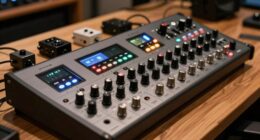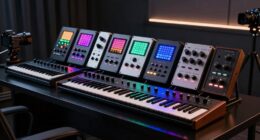When it comes to launching a successful career in music production, attending a top-ranked university can make all the difference. I consider factors like teaching expertise, faculty experience, industry connections, curriculum depth, and quality of recording studios. Universities that offer well-rounded curricula, hands-on experience with industry-standard equipment, and strong industry ties can provide valuable insights and skills. To get started, I look for programs with expert instructors, quality internships, and partnerships with professional studios and music tech firms. By choosing the right university, I can gain access to valuable resources and connections that can help me succeed in the music production industry – and I'm about to find out which universities make the cut. Researching the best universities for music production is a crucial step in narrowing down the options and finding programs that align with my career goals. These institutions not only provide top-tier education but also foster creative growth through collaborative projects and exposure to the latest trends in the music industry. By enrolling in one of these esteemed programs, I can build a solid foundation for a thriving career in music production. Additionally, exploring the best universities for music production allows me to compare unique program offerings, such as specialized courses in audio engineering, sound design, and music business. Such programs often emphasize innovation and encourage students to develop their personal artistic vision while mastering technical skills. By choosing one of the best universities for music production, I can ensure I am learning from industry leaders and staying ahead in a competitive and ever-evolving field.
Key Takeaways
- Look for universities with experienced faculty and industry connections for networking and internship opportunities.
- A well-rounded curriculum covering recording techniques, audio engineering, and music theory is essential for music production education.
- Quality of recording studio and access to industry-standard equipment and software impact hands-on learning and practical experience.
- Industry connections and partnerships provide opportunities for guest lectures, workshops, and collaborations, enhancing real-world experience.
- Alumni networks and job placement assistance are crucial for career advancement in the music production industry.
Making Music in Selznicks Hollywood (Oxford Music/Media Series)

If you're an aspiring music producer fascinated by the intersection of music and film, the book 'Making Music in Selznick's Hollywood' is a must-read, offering a unique glimpse into the creative process of film scoring during Hollywood's golden age.
Through its pages, I've gained insight into the correspondence between legendary producer David O. Selznick and composers like Max Steiner, Franz Waxman, and Dimitri Tiomkin, highlighting the collaborative efforts and occasional competitions that arose from tight movie release deadlines.
The book sheds light on the pivotal role music played in shaping the cinematic experience, revealing surprising practices and challenges surrounding musical collaboration during that era.
I've also learned about the significant contributions of composers like Hugo Friedhofer, who were brought in to meet deadlines, and the synthesis of disciplines needed to create great film scores.
Best For: Aspiring music producers, film enthusiasts, and anyone interested in the history of film scoring and the golden age of Hollywood.
Pros:
- Provides a unique glimpse into the creative process of film scoring during Hollywood's golden age
- Offers insight into the correspondence between legendary producer David O. Selznick and famous composers
- Sheds light on the pivotal role music played in shaping the cinematic experience during that era
Cons:
- May be too specialized for readers without a background or interest in film scoring or music production
- Some readers may find the historical context and archival research too dense or dry
- The book's focus on Selznick's Hollywood may limit its appeal to readers interested in more general film history or music topics
Music in Words: A Guide to Researching and Writing about Music

For music production students looking to refine their writing skills, 'Music in Words: A Guide to Researching and Writing about Music' is an invaluable resource that provides an exhaustive guide to writing about music composition and performance. This scholarly style guide covers areas not found in popular style guides, making it an essential tool for musicians, teachers, and academics.
I appreciate how it offers practical tips on writing program notes, essays, and bibliographies about music, as well as guidance on researching music, including citation and reference systems. The book's all-encompassing approach helps bring uniformity to the field of music writing, making it a must-have resource for anyone serious about writing about music.
With its straightforward and easy-to-read style, 'Music in Words' is highly recommended for music majors, providing instruction on the writing process and mechanics.
Best For: Music production students, musicians, teachers, and academics who want to refine their writing skills and produce high-quality written work about music.
Pros:
- Provides practical tips on writing program notes, essays, and bibliographies about music
- Offers comprehensive guidance on researching music, including citation and reference systems
- Straightforward and easy-to-read style makes it accessible to readers of all levels
Cons:
- Some users find the book overly detailed or unnecessary for experienced researchers
- Issues with formatting, such as missing page numbers in the Kindle version
- May not be suitable for casual music enthusiasts or those not interested in academic-level writing
American Popular Music

If you're interested in exploring the rich terrain of American popular music, universities that offer courses incorporating textbooks like 'American Popular Music: From Minstrelsy to MP3' are the best choice, as they provide a thorough introduction to the development of various genres from multicultural roots to the digital age.
This in-depth textbook delves into the cultural and social history of jazz, blues, country, rock, hip-hop, and other genres, offering a unique blend of analytical study and historical context. With 60 featured musical selections in MP3 format available for download with new copies, students can gain a deeper understanding of the genres and their evolution.
By choosing a university that incorporates this textbook into their curriculum, I'm confident that I'll receive a well-rounded education in American popular music.
Best For: Students and music enthusiasts interested in exploring the rich terrain of American popular music, particularly those taking courses related to American music.
Pros:
- Provides a thorough introduction to the development of various genres from multicultural roots to the digital age
- Offers a unique blend of analytical study and historical context
- Includes 60 featured musical selections in MP3 format available for download with new copies
Cons:
- Some issues with the scratch-off download key included in new copies
- Buying a used version might be more cost-effective
- Download code is good for one use only
Langloz Manuscript: Fugal Improvisation through Figured Bass

As music production students explore the world of fugal improvisation, the Langloz Manuscript: Fugal Improvisation through Figured Bass stands out as a valuable resource for those seeking to master contrapuntal techniques and reveal the secrets of Baroque-era composition.
This unique approach to fugue writing focuses on practical exercises, presenting fugues on a single staff with harmonic structure indicated by numbers, similar to a jazz chart. By working through these exercises, students can develop their contrapuntal thinking within the context of figured bass, which was an essential skill for Baroque composers like J.S. Bach.
The Langloz Manuscript offers a window into the improvisation process of the era, providing a thorough understanding of thoroughbass, a critical aspect of keyboard technique, improvisation, performance, and composition.
Best For: Music production students, composers, and musicians seeking to master contrapuntal techniques and improve their understanding of Baroque-era composition and improvisation.
Pros:
- Provides a unique approach to fugue writing through practical exercises, focusing on figured bass and contrapuntal thinking.
- Offers a valuable resource for teaching fugal techniques and improvisation, with a thorough understanding of thoroughbass and its importance in Baroque-era music.
- Represents the largest extant collection of figured bass fugues, providing a window into the improvisation process of the era.
Cons:
- The book is expensive, which may be a barrier for some students or musicians.
- Requires proficiency in realizing figured bass, as there is no index for suggested realizations.
- May be challenging for those without a strong background in music theory and contrapuntal techniques.
Music in South India by T. Viswanathan

While exploring the rich cultural heritage of Indian music, I often find myself drawn to 'Music in South India: The Karnatak Concert Tradition and Beyond' by T. Viswanathan, a valuable resource that provides an in-depth introduction to Carnatic music. This detailed book covers various aspects of music in South India, including bhajans, kritis, ragas, and talas, offering insights into the sociological aspects of music in the region.
The authors, Tanjore Viswanathan and Matthew Harp Allen, are renowned Carnatic musicians and educators, bringing their expertise to the table. The book's five chapters cover Carnatic music theory, concert elements, and sociological topics, also touching on special features of Keralite music, cinema music, and cross-cultural collaborations.
The accompanying CD, featuring a full concert recording of a kriti performance, enhances the learning experience, making this book a must-have for those interested in world music, ethnomusicology, or music education.
Best For: Those interested in world music, ethnomusicology, or music education, serving as a valuable resource for multicultural music studies.
Pros:
- Provides a clear introduction to Carnatic music, covering various aspects of music in South India
- Includes a CD with music samples related to the text, enhancing the learning experience
- Written by renowned Carnatic musicians and educators, bringing their expertise to the table
Cons:
- Some readers find the book to be superficial in its treatment of Carnatic music
- Lacks in-depth exploration of certain topics
- May not provide enough depth for advanced learners or experts in the field
What the Best College Teachers Do

When it comes to music production, I look for educators who not only possess expert-level technical skills but also embody the qualities outlined in 'What the Best College Teachers Do,' a book that highlights the importance of effective teaching practices that transcend disciplines.
This book provides a framework for good teaching by posing fundamental pedagogical questions, offering valuable advice and practices that require insight and experience to appreciate fully. By emphasizing the importance of understanding teaching and learning in ways that challenge and motivate educators, it encourages continuous learning and improvement in teaching.
As an educator, I appreciate the practical advice and insights shared in this book, which distills best practices from great teachers and encourages a deeper understanding of effective teaching practices.
Best For: Educators looking to enhance their teaching practices and understanding of learning.
Pros:
- Provides a framework for good teaching by posing fundamental pedagogical questions
- Offers valuable advice and practices that require insight and experience to appreciate fully
- Encourages continuous learning and improvement in teaching
Cons:
- None mentioned in the provided text.
Beyond the Soundtrack: Representing Music in Cinema

If you're looking to master the art of scoring for film, you'll want to explore the intricate relationship between music and cinema, as investigated in 'Beyond the Soundtrack: Representing Music in Cinema'.
This groundbreaking collection of essays by distinguished musicologists and film scholars sheds light on the equal footing of music and image in shaping the film experience. By refuting the idea that music is merely a prop for narrative, these essays demonstrate that music is an active power in film worlds, making an independent contribution even when playing a supporting role.
Through a broad range of narrative films from the silent era to the present, the authors reveal that there's no unheard music in cinema, highlighting the richness of cinematic representation of music.
Best For: Film composers, musicologists, and cinema scholars looking to deepen their understanding of the intricate relationship between music and cinema.
Pros:
- Provides a comprehensive analysis of the role of music in film, recognizing its equal importance to the image in shaping the film experience.
- Offers a broad range of perspectives from distinguished musicologists and film scholars, ensuring a rich and nuanced understanding of the topic.
- Covers a wide range of narrative films from the silent era to the present, making it a valuable resource for those interested in film history and music.
Cons:
- May be too theoretical or academic for those without a background in musicology or film studies.
- Does not provide practical guidance on how to score for film, but rather focuses on the theoretical and analytical aspects of music in cinema.
- May not be accessible to readers without a strong foundation in music theory or film analysis.
The Best 387 Colleges, 2022 College Admissions Guide

For prospective music production students seeking a thorough college guide, The Best 387 Colleges, 2022 College Admissions Guide stands out with its detailed and well-rounded information on top colleges.
As I explored this extensive resource, I appreciated the inclusion of student opinions, numerical measurements, and admissions information, which provided a multifaceted view of each institution.
The guide's organization and consistency are highly commendable, making it easy to navigate and compare colleges.
I found the background information on many colleges to be particularly valuable, as it offered insights into campus social scenes, dorm life, professor accessibility, and class sizes.
This guide truly lived up to its reputation, and I'd highly recommend it to anyone researching colleges.
Best For: Prospective college students and their families seeking a comprehensive guide to top colleges.
Pros:
- Provides concise and well-rounded information on top colleges, including student opinions, numerical measurements, and admissions information.
- Offers valuable insights into campus social scenes, dorm life, professor accessibility, and class sizes.
- Highly organized and consistent, making it easy to navigate and compare colleges.
Cons:
- No national ranking included in the book.
- Caution advised when purchasing from third-party sellers, as quality and authenticity may not be guaranteed.
- May not include access to online tests or materials included in the original product when purchased from third-party sellers.
John Coltrane: His Life and Music (The Michigan American Music Series)

Frequently, music production students seeking in-depth explorations of jazz legends like John Coltrane will find the perfect fit in universities that offer courses centered around his life and music, as meticulously chronicled in 'John Coltrane: His Life and Music (The Michigan American Music Series)'.
This book, written by Lewis Porter, a musician and lecturer of music at a US university, provides an unparalleled insight into Coltrane's life and music. The biography portions are excellent, and the musical analysis, although detailed, is accessible to non-specialists.
The book includes a wealth of never-before-published material, including interviews, photos, and genealogical documents, making it a valuable resource for music enthusiasts and professionals alike. As a must-have for any jazz musician's library, it's no wonder that popular opinion considers it the best musical bio of Trane available.
Best For: Music production students, jazz musicians, and music enthusiasts seeking an in-depth exploration of John Coltrane's life and music.
Pros:
- Provides an unparalleled insight into Coltrane's life and music
- Includes a wealth of never-before-published material, including interviews, photos, and genealogical documents
- The musical analysis is accessible to non-specialists, making it a valuable resource for music enthusiasts and professionals alike
Cons:
- The musical analysis may be overwhelming for those without a musical background
- The book assumes a certain level of musical knowledge, which may not be suitable for all readers
- The detailed musical analysis may not be of interest to readers seeking a more general biography of Coltrane
Global Soundtracks: Worlds of Film Music (Music / Culture)

When it comes to exploring the diverse and dynamic world of film music, 'Global Soundtracks: Worlds of Film Music (Music / Culture)' stands out as an extensive anthology that offers a wealth of insights for music production students seeking to broaden their cultural understanding and artistic scope.
As a music production student, I find it fascinating to investigate the 15 articles compiled by a Wesleyan University professor, which bring together perspectives from authors from the U.S., Nigeria, and foreign-born scholars now based in the U.S.
This anthology is a treasure trove of knowledge, combining ethnomusicology, multiculturalism, anthropology, popular art, and music to provide a thorough understanding of film music from various regions, including the U.S., India, Indonesia, Brazil, and more.
The analysis of film music is rich and nuanced, exploring how music enhances the viewer experience, contributes to the making and effects of a movie, and is integral to the storytelling and visual aspects of films.
Best For: Music production students and film enthusiasts seeking to broaden their cultural understanding and artistic scope.
Pros:
- Offers a comprehensive understanding of film music from various regions and cultures
- Provides nuanced analysis of music in films, exploring its contribution to the viewer experience and storytelling
- Features contributions from renowned scholars in the field of music, ensuring a high level of expertise and authority
Cons:
- May be too academic or theoretical for readers without a background in music or film studies
- The hardcover edition may be expensive or difficult to obtain
- The anthology's focus on social and cultural meanings of film music may not appeal to readers seeking a more technical or practical approach to film music
The Poets of Tin Pan Alley

As I explore the world of music production, I'm drawn to the poetic mastery of Tin Pan Alley's prominent songwriters, whose lyrical genius continues to shape American popular music to this day.
These iconic figures, including Irving Berlin, Cole Porter, and the Gershwin brothers, have left an indelible mark on the industry. Their influence extends far beyond their era, with regular revivals of their musicals and continued analysis of their methods and styles.
In fact, their songs form the bedrock of jazz and cabaret, demonstrating the significance of their contributions. By examining the poetic lyrics of these songwriters, we can gain a deeper understanding of the importance of lyrics in shaping American popular song.
Best For: Music enthusiasts, students of American popular music, and anyone interested in the poetic mastery of Tin Pan Alley's prominent songwriters.
Pros:
- Provides a comprehensive survey of the prominent songwriters of Tin Pan Alley, including their influence on American popular music and their continued relevance today.
- Offers a unique perspective on the songwriters, emphasizing the poetic lyrics and their importance in shaping American popular song.
- Places the songwriters in a historical context, connecting them to the era of The New Yorker, Don Marquis, Dorothy Parker, and E.B. White.
Cons:
- May not provide an in-depth analysis of the songwriters' personal lives or biographies.
- Could benefit from more examples of the songwriters' work and how it has been interpreted and reinterpreted over time.
- May not be suitable for readers without a prior interest in American popular music or Tin Pan Alley.
Werner Herzog: Interviews (Conversations with Filmmakers Series)

As I explore the world of music production, I find myself drawn to the unexpected inspiration of Werner Herzog, a renowned filmmaker with a wealth of knowledge to share on the role of music in film.
While music production enthusiasts may not immediately associate Werner Herzog with their field of study, his thoughts on the role of music in film provide invaluable insights for anyone looking to elevate their craft.
In Werner Herzog: Interviews (Conversations with Filmmakers Series), the director shares his unique perspective on the importance of music in film, revealing how it can elevate the narrative and create a lasting impact on audiences.
Through this collection of interviews, Herzog offers a glimpse into his creative process, discussing how he selects scores that perfectly complement his cinematic vision.
Best For: Filmmakers, music producers, and enthusiasts interested in the role of music in film and the creative process of a renowned director.
Pros:
- Provides invaluable insights into the importance of music in film and its impact on the narrative
- Offers a unique perspective on the creative process of a renowned filmmaker
- Includes previously unpublished interviews from Herzog's production archive, providing an unprecedented look at his work and career
Cons:
- May not be directly applicable to music production enthusiasts without a background in filmmaking
- The collection of interviews may not provide a comprehensive guide to music production
- Some readers may find Herzog's peculiar themes and characters not relevant to their own work in music production
Teaching Approaches in Music Theory

When it comes to mastering music theory, students at the best universities for music production need a thorough foundation in teaching approaches that cater to diverse learning styles and pedagogical philosophies.
I've found that an all-encompassing book on teaching music theory provides invaluable insights into effective pedagogy, covering areas like fundamentals, counterpoint, analysis, and ear training.
The author's emphasis on thoughtful examination and critique of assumptions behind textbooks, materials, and technologies resonates with me, as staying updated on the latest advancements in music theory education is crucial.
The book's well-structured approach, presenting pedagogical philosophies and dichotomies effectively, makes it an excellent resource for teachers, theorists, students, and private study.
Best For: Music theory educators, students, and private learners seeking a comprehensive guide to teaching music theory pedagogy.
Pros:
- Provides a thorough and well-structured approach to teaching music theory, covering various pedagogical philosophies and areas such as fundamentals, counterpoint, analysis, and ear training.
- Offers valuable insights into effective teaching strategies and curriculum construction, making it an excellent resource for teachers and students alike.
- Emphasizes the importance of critical thinking and staying updated on the latest advancements in music theory education, ensuring a solid foundation for further exploration.
Cons:
- As an older edition, some of the references to electronic advances and devices may be outdated.
- May not provide enough practical exercises or examples for some readers.
- Some readers may find the author's biases and opinions on certain aspects of music theory pedagogy to be limiting or subjective.
Bookmark for Music Teacher and Students

For music teachers and students seeking to enhance their craft, the 'Best Universities for Music Production' serves as a valuable resource, offering a curated list of top institutions that cater to their specific needs and goals.
As I explore the world of music education, I've come to realize the importance of having a reliable bookmark that provides gifts and resources tailored to music lovers. That's why I'm excited to share with you a range of gifts perfect for music teachers, students, and musicians.
Whether you're looking for a unique graduation gift, a retirement present, or a Christmas stocking stuffer, Ambergrissun's products are sure to impress. With their decorative desk signs, ideal for high school and college graduates, and their leisure-themed gifts for retired individuals, you'll find the perfect way to celebrate milestones and show appreciation.
Best For: Music teachers, students, and musicians seeking unique gifts for various occasions.
Pros:
- Offers a range of gift options for music lovers, including graduation gifts, retirement presents, and Christmas stocking stuffers.
- Provides decorative desk signs ideal for high school and college graduates.
- Celebrates milestones and shows appreciation for music educators and enthusiasts.
Cons:
- Limited to music-themed gifts, may not appeal to those with different interests.
- May not be suitable for large-scale or corporate gifts.
- Gift options may be too specialized for some occasions.
Piano Book for Adult Beginners

If you're an adult looking to start your music production journey with a solid foundation in piano skills, the Piano Book for Adult Beginners is an ideal choice, offering a thorough and easy-to-follow approach to building your skills from scratch.
Recommended by Rolling Stone Magazine as the best beginner piano book, this detailed guide is designed specifically for adult learners, providing step-by-step lessons that cater to their unique needs.
With 20 streaming video lessons and 75 MP3 audio files, you'll have access to a wealth of resources to support your learning.
The book's song selection is impressive, featuring famous piano pieces like Für Elise and The Entertainer, which will help you expand your repertoire and improve your technique.
As you progress through the book, you'll learn to read music, develop your musical understanding, and enhance your creativity.
Best For: Adult beginners who want to learn piano skills from scratch with a structured and easy-to-follow approach.
Pros:
- Recommended by Rolling Stone Magazine as the best beginner piano book, ensuring a high-quality learning experience
- Includes a wealth of resources, such as 20 streaming video lessons and 75 MP3 audio files, to support learning
- Teaches piano basics clearly and gradually, making it suitable for adult beginners with no prior musical experience
Cons:
- Some users may find it helpful to have examples to listen to for each song, which is not provided
- Requires consistent practice to see improvement, which can be time-consuming and challenging
- May not be suitable for those who prefer a more traditional piano learning approach
Factors to Consider When Choosing Universities for Music Production

As I research the best universities for music production, I've come to realize that there are several key factors to keep in mind when making this important decision. Specifically, I'm looking for institutions that boast teaching expertise, faculty experience, and industry connections that can open doors for students.
Teaching Expertise
When selecting a university for music production, I prioritize institutions where faculty members bring a wealth of teaching expertise in areas like music theory, composition, audio engineering, and production techniques to the table. Finding instructors with practical industry experience is crucial, as they can provide real-world insights and prepare students for modern production environments.
I also emphasize universities where faculty focus on emerging technologies and trends in the music industry, ensuring students are well-equipped to tackle the latest challenges.
Moreover, I consider universities with faculty who've connections to industry professionals, studios, and labels, offering valuable networking and internship opportunities. The presence of specialized courses or workshops taught by industry experts is also a significant advantage, as they enhance students' skills and knowledge in music production.
Ultimately, I seek universities with faculty who are experienced professionals in the music production industry, have a strong track record of producing successful music producers, and actively work in the field, bringing real-world experience to the classroom.
Faculty Experience
I look for universities where faculty members bring a depth of experience in music production, having worked in various roles such as producers, composers, or engineers, and can offer valuable insights and industry connections.
It's important to have professors who've won awards or recognition in the music industry, showcasing their expertise and accomplishments.
I also consider whether faculty members are actively involved in current music production projects, guaranteeing their knowledge is up-to-date with industry trends and technologies.
A strong network within the music production industry is also essential, providing students with opportunities for internships, collaborations, and career advancement.
I research the faculty's credentials, including awards, publications, or industry affiliations, to assess their expertise in music production.
Having experienced faculty can offer practical knowledge, mentorship, and guidance to help students succeed in the competitive music production industry.
Industry Connections
As I explore the world of music production, I've come to realize that industry connections are an essential aspect to take into account when choosing a university. Three key industry connection factors to contemplate when selecting a university for music production are the quality of internships, mentorship opportunities, and job placement assistance offered through these connections.
Universities with strong industry ties can provide students with access to professional studios, equipment, and resources, enabling hands-on learning and practical experience. Additionally, industry partnerships can lead to guest lectures, workshops, and collaborations with professionals in the field, enhancing students' industry knowledge and skills.
What's more, universities with strong industry connections can help students secure placements in record labels, production companies, and music tech firms post-graduation. Alumni networks can also play a significant role in landing internships, jobs, and industry opportunities after graduation. By taking these factors into account, I can make sure that I'm getting the most out of my music production education and setting myself up for success in the industry.
Curriculum Depth
Exploring the curriculum depth of music production programs is crucial to guarantee I receive a thorough education that equips me for a successful career in the industry. When evaluating universities, I look for programs that offer a well-rounded curriculum covering fundamental aspects of music production, including recording techniques, audio engineering, music theory, and digital audio workstations. I also consider the availability of specialized courses in areas like sound design, music business, post-production, and live sound, which can broaden my knowledge and expertise.
Additionally, I research the faculty's backgrounds and experience in the music production industry, as they can offer valuable insights, connections, and mentorship opportunities. A diverse curriculum should provide hands-on experience with industry-standard equipment and software, allowing me to develop practical skills in music production. I also seek universities that offer internships, industry partnerships, and networking opportunities, which can provide real-world experience and help me establish connections in the music production field.
Recording Studio
Beyond curriculum depth, the quality and resources of a university's recording studio play a significant role in preparing me for a career in music production. A well-equipped recording studio offers hands-on experience in a professional-grade facility, allowing me to learn the ins and outs of recording equipment, mixing tracks, and producing music.
Industry-standard software and hardware are typically featured in these studios, providing me with the opportunity to develop technical skills and creative techniques. Collaborative projects with other musicians and producers are also an essential aspect of recording studio work, giving me real-world experience in music production.
By utilizing a university's recording studio, I can gain practical experience in recording, mixing, and mastering music in a professional setting. This helps me build a portfolio of work to showcase my skills to potential employers.
Ultimately, a university's recording studio is an important factor to take into account when choosing a music production program, as it provides me with the necessary tools and experience to succeed in the industry.
Software Proficiency
When it comes to choosing a university for music production, I look for programs that prioritize software proficiency, as mastering industry-standard tools like Pro Tools, Logic Pro, Ableton Live, and FL Studio is essential for success in the music industry.
Understanding the usage of plugins, virtual instruments, and digital audio workstations (DAWs) is important for students studying music production. Practical hands-on experience with software tools is necessary for developing skills in editing, mixing, and mastering music tracks.
I also consider universities that offer access to recording studios equipped with the latest software and hardware technology, providing students with real-world experience in music production. Proficiency in software applications is a key factor in preparing students for careers as producers, engineers, or sound designers.
Live Performance
As I explore the world of music production, I recognize that live performance opportunities are essential for students to gain practical experience, hone their skills, and make industry connections.
Universities with strong ties to the music industry can offer students more chances to perform live, which is vital for applying theoretical knowledge in a real-world setting. Live performances can take many forms, including concerts, recitals, showcases, and collaborations with other musicians. These opportunities allow students to receive feedback from audiences, build confidence, and develop stage presence.
Additionally, live performances provide a platform for students to network with industry professionals, enhancing their career prospects. Many universities for music production offer opportunities for students to gain live performance experience through concerts, recitals, and showcases. These experiences not only help students apply their music production skills in a real-world setting but also allow them to interact with audiences and collaborate with other musicians, artists, and producers.
Alumni Network
While gaining practical experience through live performances is important, I'm also looking for a university with a strong alumni network that can provide valuable connections and opportunities after graduation.
A robust alumni network can offer mentorship, job leads, and industry insights, which are essential for maneuvering the competitive music production industry. The size and engagement of an alumni network can reflect the success and reputation of a music production program, so it's important to take into account this factor when selecting a university.
Active alumni networks often host events, workshops, and networking opportunities for current students and recent graduates, providing a platform for collaboration, partnerships, and ongoing support. By networking with alumni from reputable music production programs, I can open doors to internships, collaborations, and career advancements in the industry.
A strong alumni network can provide valuable connections, mentorship, and career opportunities, helping me build a professional portfolio and establish a successful career path.
Frequently Asked Questions
Can I Get a Music Production Degree Online?
"Yeah, I can totally get a music production degree online While it may not be the traditional route, many reputable institutions offer online programs, allowing me to learn from industry pros from the comfort of my own studio."
Do Music Production Universities Offer Internships?
'Did you know 75% of music producers find internships essential for success? I've found that many music production universities offer internships, providing hands-on experience and valuable industry connections that can jumpstart my career.'
Are Music Production Programs Accredited?
"I've researched music production programs and found that many are accredited by organizations like the National Association of Schools of Music (NASM) or the Accrediting Commission of Career Schools and Colleges (ACCSC)."
Can I Specialize in a Specific Music Genre?
"Did you know 75% of music producers specialize in a specific genre? Yeah, me too I can focus on my passion, whether it's electronic, hip-hop, or classical, and develop expertise that sets me apart in the industry."
Are Music Production Courses Available for Beginners?
"Absolutely I've seen music production courses designed specifically for beginners, covering the basics of DAWs, sound design, and mixing. These courses are perfect for those new to music production, like me, who want to learn from scratch!"
Conclusion
After sifting through a sea of sound, I've narrowed down the crème de la crème of music production universities.
From prestigious institutions to hidden gems, these 15 powerhouses will transform you into a maestro of music technology.
With cutting-edge facilities, industry-savvy professors, and a network of like-minded creatives, you'll be well on your way to producing chart-topping hits and breaking boundaries in the music world.









